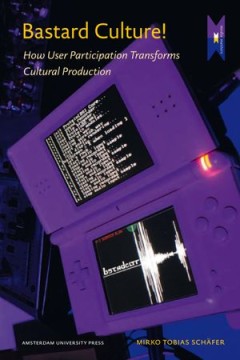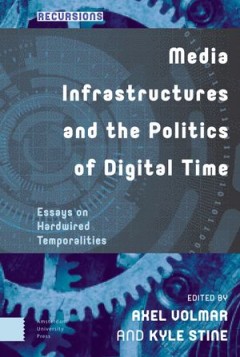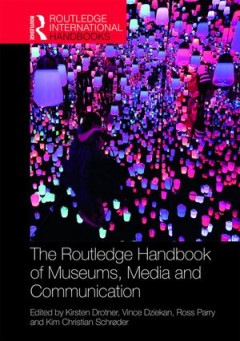Filter by

Equality in the City : Imaginaries of the Smart Future
This collection critiques the rhetoric of ‘smart cities’. It seeks to engender a timely debate about what future cities might look like and what their concerns should be. Using a multi-disciplinary perspective, it features acclaimed scholars whose work investigates the proposed networked digital technologies that ostensibly affect planning policies, control infrastructures and deliver and m…
- Edition
- -
- ISBN/ISSN
- 9781789384659
- Collation
- -
- Series Title
- -
- Call Number
- -

Video Games, Crime and Next-Gen Deviance : Reorienting the Debate
The ebook edition of this title is Open Access, thanks to Knowledge Unlatched funding, and freely available to read online. In recent decades the video games industry has grown astronomically, quickly becoming a substantial part of our everyday lives. Alongside the rise of this technology, the media, academia and, in some cases, governments, have drawn correlations between video games and serio…
- Edition
- -
- ISBN/ISSN
- 9781838674502
- Collation
- -
- Series Title
- -
- Call Number
- -

Animals, Plants and Afterimages : The Art and Science of Representing Extinction
The sixth mass extinction or Anthropocene extinction is one of the most pervasive issues of our time. Animals, Plants and Afterimages brings together leading scholars in the humanities and life sciences to explore how extinct species are represented in art and visual culture, with a special emphasis on museums. Engaging with celebrated cases of vanished species such as the quagga and the thylac…
- Edition
- -
- ISBN/ISSN
- 9781805390671
- Collation
- -
- Series Title
- -
- Call Number
- -

Body, Capital and Screens Visual Media and the Healthy Self in the 20th Century
Visual Media and the Healthy Self in the 20th Century brings together new research from leading scholars from Europe and North America working at the intersection of film and media studies and social and cultural history of the body. The volume focuses on visual media in the twentieth century in Europe and the U.S. that informed and educated people about life and health as well as practices imp…
- Edition
- -
- ISBN/ISSN
- 9789048540310
- Collation
- -
- Series Title
- -
- Call Number
- -

Battlefields of Negotiation
The massively multiplayer online role-playing game World of Warcraft has become one of the most popular computer games of the past decade, introducing millions around the world to community-based play. Within the boundaries set by its design, the game encourages players to appropriate and shape the game to their own wishes, resulting in highly diverse forms of play and participation. This illum…
- Edition
- -
- ISBN/ISSN
- 9789089645005
- Collation
- -
- Series Title
- -
- Call Number
- -

Bastard Culture! How User Participation Transforms Cultural Production
New online technologies have brought with them a great promise of freedom. The computer and particularly the Internet have been represented as enabling technologies, turning consumers into users and users into producers. Furthermore, lay people and amateurs have been enthusiastically greeted as heroes of the digital era. This thoughtful study casts a fresh light on the shaping of user participa…
- Edition
- -
- ISBN/ISSN
- 9789089642561
- Collation
- -
- Series Title
- -
- Call Number
- -

Media Infrastructures and the Politics of Digital Time Essays on Hardwired T…
Digital media everyday inscribe new patterns of time, promising instant communication, synchronous collaboration, intricate time management, and profound new advantages in speed. The essays in this volume reconsider these outward interfaces of convenience by calling attention to their supporting infrastructures, the networks of digital time that exert pressures of conformity and standardization…
- Edition
- -
- ISBN/ISSN
- 9789048550753
- Collation
- -
- Series Title
- -
- Call Number
- -

Media, Knowledge & Education Exploring New Spaces, Relations and Dynamics in…
In recent years, new and established media have penetrated, challenged, and often surpassed in significance traditional institutions of socialization and education. Moreover, the social organization of knowledge production and distribution has become highly mediated through increasingly complex combinations of information and communication technologies. The papers in this volume are exploring i…
- Edition
- -
- ISBN/ISSN
- 9783902571670
- Collation
- -
- Series Title
- -
- Call Number
- -

The Routledge Handbook of Museums, Media and Communication
Museums today find themselves within a mediatised society, where everyday life is conducted in a data-full and technology-rich context. In fact, museums are themselves mediatised: they present a uniquely media-centred environment, in which communicative media is a constitutive property of their organisation and of the visitor experience. The Routledge Handbook of Museums, Media and Communicatio…
- Edition
- -
- ISBN/ISSN
- 9781317197430
- Collation
- -
- Series Title
- -
- Call Number
- 930.1 ROU r

The Routledge Companion to Media and Race
The Routledge Companion to Media and Race serves as a comprehensive guide for scholars, students, and media professionals who seek to understand the key debates about the impact of media messages on racial attitudes and understanding. Broad in scope and richly presented from a diversity of perspectives, the book is divided into three sections: first, it summarizes the theoretical approaches tha…
- Edition
- -
- ISBN/ISSN
- 9781317695837
- Collation
- -
- Series Title
- -
- Call Number
- 302.23 MED m
 Computer Science, Information & General Works
Computer Science, Information & General Works  Philosophy & Psychology
Philosophy & Psychology  Religion
Religion  Social Sciences
Social Sciences  Language
Language  Pure Science
Pure Science  Applied Sciences
Applied Sciences  Art & Recreation
Art & Recreation  Literature
Literature  History & Geography
History & Geography